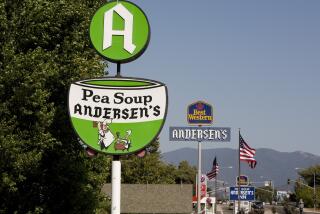Campbell Shutdown Leaves Town in the Soup
- Share via
CAMDEN, N.J. — Workers at Campbell Soup Co.’s oldest manufacturing plant picked up their final paychecks today after production halted at the 121-year-old birthplace of condensed soup.
The last can of pork and beans rolled off the production line at midnight.
“By 3 o’clock it will be a ghost town after 121 years,” said company spokesman James Moran.
Employees began arriving at the historic plant at about 7:30 a.m. as the company distributed final paychecks and severance and vacation benefits, Moran said.
He said employees also were able to sign up for unemployment benefits before saying goodby.
By late afternoon, Campbell expects to have processed all of the nearly 1,000 workers who will return for their last paychecks, Moran said.
A skeleton crew will remain to dismantle equipment and ship inventory from the warehouse. Moran said it’s likely that the plant, too, will be razed, along with the four huge soup cans that have long dominated the skyline on the Delaware River across from Philadelphia.
The closing is part of a worldwide restructuring Campbell announced last August that will eliminate 2,800 jobs in Camden and at plants in Maryland and Tennessee. The move is expected to save the company $15 million during fiscal 1990 and $150 million during the next four years.
The closure comes at a crucial time for this city of 85,000, which is struggling to revitalize its business sector. Many of the blue-collar employees at the plant have worked for Campbell most of their lives, and their future is uncertain.
Employees, some garbed in drab green Campbell uniforms, gathered in front of the eight-story building Thursday, shaking hands and bidding farewells.
“Today is the funeral. Tomorrow is the burial,” said Alvin Apple Still, president of Local 80 of the United Food and Commercial Workers, which represents about 640 of the hourly employees in the plant. “We’ve been let down.”
Still, who worked at the plant for more than 40 years, is among about 230 employees who qualify for a pension plan. The others aren’t as fortunate, he said.
“The rest of them will have to root for what they can find,” Still said. “There’s no job market in the city.”
Campbell said it would have cost millions to renovate the plant. The company is trying to improve its performance and pacify some members of its founding family who are pushing for a sale of the entire food-products giant.
During its heyday in the 1930s, the Camden plant produced 10 million cans of red-and-white labeled soup varieties daily.
More to Read
Inside the business of entertainment
The Wide Shot brings you news, analysis and insights on everything from streaming wars to production — and what it all means for the future.
You may occasionally receive promotional content from the Los Angeles Times.










